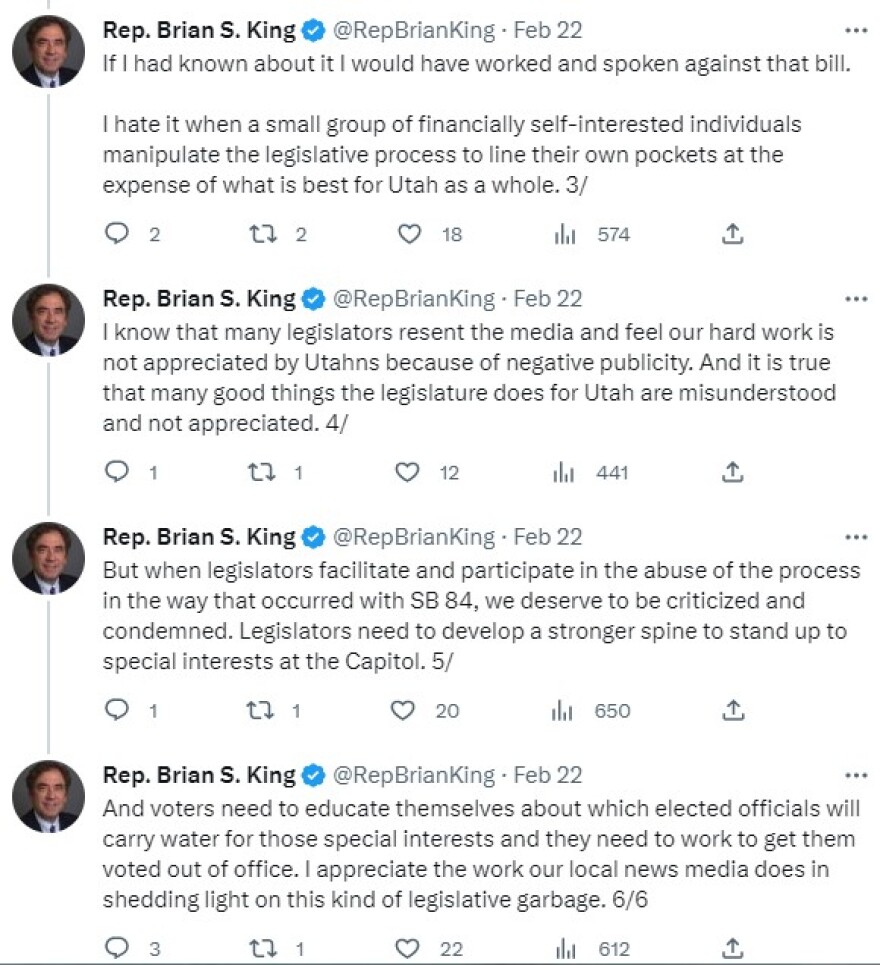There are three more working days left in this year’s legislative session and still to come is passage of the state’s $28 billion budget. It includes teacher raises in exchange for approving school vouchers, two-tenths of a percent reduction in the state income tax and $40 million to update the state’s 2002 Olympic venues.
The good news, according to Rep. Brian King (D-23) who represents a small portion of Summit County, is that Utah is the only state in the country that has every legislator actively working on a budget committee. He said that gives everyone a piece of the action in terms of putting together budgets. But he doesn’t agree with all those decisions.
Billed as the year of the tax cut, lawmakers are proposing to reduce the state income tax from 4.85% to 4.65% - at a cost of about $400 million to the state coffers. While that lowers everyone’s tax bills, King said it mostly benefits the rich.
“It’s definitely disproportionately geared toward the wealthiest," King said. "It's the same percentage across the board and that way legislators can and do say, 'Hey, we're treating everyone equally.' But the end result, the practical effect of this tax definitely helps those well off more than it helps those who aren't. And that is one of the things that troubles me about it and I wish we had a tax cut that was more geared toward the people and populations that need it most.”
The sales tax on food remains unchanged, which would benefit those on the lower end of the income scale if it was eliminated. Republican lawmakers have long wanted to do away with the constitutional earmark that requires all income taxes go to public and higher education. They say they would do away with the sales tax on food and add more money to public education, if voters agree to release that earmark in an election in 2024.
“It doesn't take a rocket scientist to figure out that if you have a constitutional requirement that certain levels of funding of taxpayer money, income tax, goes to education, and you want to exchange that for a statutory obligation of some type that can be changed at the whim of any legislature at any time, that doesn't seem to be to be a good trade,” King said.
King also said he doesn’t support HB 251, which gave all Utah teachers a $6,000 pay raise in exchange for moving $41 million from public to private school education through a school voucher program. King said the bill was immediate gratification exchanged for long term detriment to education.
“But the more experience we have with voucher programs, I think, from what I'm seeing and reading, I tried to do my research on this, the more we're seeing that voucher programs are not delivering. They're not providing the kind of improved outcomes, especially for vulnerable populations, that they're marketed as being able to produce,” King said.
King has also publicly apologized for the passage of SB 84 which directly targets Summit County as the county processes the application for the Dakota Pacific development at Kimball Junction. King tweeted there was no meaningful discourse in the House before or during floor debate on the aspects of the bill that affected Summit County and if he had known, he would have worked and spoken against the bill.

At this point, he said he’s not optimistic that anything can be done to change it.
“The 45-day session puts us in such a compressed timeframe that if you have people that are willing to be underhanded, and we saw this with the Hideout issue a couple of years ago, some people are just underhanded in terms of pulling things in and flipping things in at the last minute without any notice, and without any real opportunity to be heard, it may very well be something that we have to look at in terms of process so that people can find out what's in it and not vote for that until there's been adequate time for people to understand what they're voting," King said.
Following party lines, King voted against HB 219, which designates Utah as a Second Amendment sanctuary state. The bill states Utah won’t enforce federal regulations that restrict or ban certain firearms, ammunition or accessories. Wasatch County adopted a similar ordinance in 2021.
The legislative session ends at midnight Thursday, March 3.


